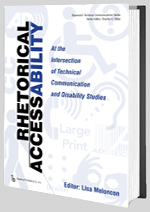2nd Edition of e-Learning and Disability in Higher Education out 18th August

A new edition of e-Learning and Disability in Higher Education: Accessibility, Research and Practice by Jane Seale (@janeseale, Professor of Inclusive Education at the University of Exeter) is out in paperback later this month. This seminal text was first published in 2006 and, given our fast-changing digital and educational landscape, this fully revised edition is a welcome development.
E-Learning and Disability in Higher Education supplied part of the foundation for my research into disabled students’ experiences of social media when I began my PhD – so I’m delighted that the accessible, internet-enabled research methods I developed for my doctoral work feature in the new edition as a best-practice case study.
The publishers have released the following summary:
Most people working within the higher education sector understand the importance of making e-learning accessible to students with disabilities, yet it is not always clear exactly how this should be accomplished. E-Learning and Disability in Higher Education evaluates current accessibility practice and critiques the extent to which ‘best’ practices can be confidently identified and disseminated. This second edition has been fully updated and includes a focus on research that seeks to give ‘voice’ to disabled students in a way that provides an indispensable insight into their relationship with technologies and the institutions in which they study. Examining the social, educational, and political background behind making online learning accessible in higher and further education, E-Learning and Disability in Higher Education considers the roles and perspectives of the key stake-holders involved in e-learning: lecturers, professors, instructional designers, learning technologists, student support services, staff developers, and senior managers and administrators.
Reviews are available via the Routledge site from Dr Simon Ball (@simonjball), Senior Advisor at the UK’s higher education advisory service Jisc TechDis, Dr, Alan Foley, Associate Professor of Instructional Technology at Syracuse University and Dr. Robert A. Stodden, Director and Professor, Center on Disability Studies, University of Hawaii at Manoa.
e-Learning and Disability in Higher Education is released on the 18th of August; By all accounts this will make essential reading for university professionals in e-learning, student support and related fields.



